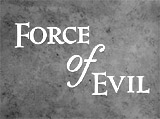
|
Force of Evil (1948)
In co-writer/director Abraham Polonsky's dark and sinister
film noir crime drama, his directorial debut film - the film's script
was based upon the 1943 novel Tucker's People by Ira Wolfert;
it was about criminal racketeering - couched in the story of two
brothers (a good one and a bad one, similar to the Cain and Abel
story) who were on opposite ends of the corrupt numbers racket.
The main protagonist - a shrewd, morally-bankrupt
and ambitious Wall Street lawyer, took on a numbers-racket gangster-crook
as his client with three goals, to make money for himself, to legalize
and legitimize the numbers business, and to bankrupt all the competing
racketeers and thereby force them to consolidate and be part of the
racketeers' monopolistic organization. The one difficult hurdle was
that the corrupt lawyer had to exploit his more-principled older
brother, who had his own illegal small-numbers bank, and was one
of those who would be severely affected by the scheme to combine
the smaller policy banks into a single entity.
The manipulative fix was that on July 4th, the winning
number (776) - selected by many due to patriotism or superstition,
would bankrupt the small time operators and "banks" who couldn't
pay up for all the winning race tickets. Twelve selected "banks"
(plus his brother's small-time 'Mom and Pop' numbers-racket bank) would
be forced to accept a loan from the racketeer to keep in business,
thereby losing control, and becoming subordinated to the strong-arm
tactics and demands of the mob and its "combination." The corrupted
lawyer attempted to salvage his brother's impending ruin by pressuring
him to join the big-time operation, leading to tragic consequences.
It was one of the few Hollywood films at the time with a devastating critique
of the corrosive influences of capitalism, including monetary greed.
The pursuit of 'capital' through monopolies was condemned because
of its dehumanizing and destructive effects. The film's settings
included urban canyons created by skyscrapers, fancy lawyer's offices,
cramped and dark rooms, and apartments where small-time crooks congregated:
- the film opened with the silky-smooth, documentary-styled
voice-over of young, successful, and on-the-make Wall Street lawyer
Joe Morse (John Garfield) during a high-angle camera view of towering
monolothic skyscrapers surrounding and overwhelming Trinity Church
near Wall Street; the legal fortune-hunter was intending to become
rich at any cost necessary: ("This
is Wall Street and today was important because tomorrow, July Fourth,
I intended to make my first million dollars, an exciting day in
any man's life. Temporarily, the enterprise was slightly illegal.
You see, I was the lawyer for the numbers racket")
- at a newsstand in the lobby of a financial district
building, Morse listened as two others spoke about their betting
luck; Morse's first words were a foreshadowing of death: "If you
don't get killed, it's a lucky day for anybody"
- Morse's voice-over continued
as he entered his upper floor law office of WHEELOCK and MORSE:
("....The suckers bet on any combination of three numbers, selected
from the totals bet at some racetrack that day. Twenty million
bettors a day in the United States - annual income of cheap crooks
and racketeers over $100,000,000 dollars. It seemed a shame for
so much good money to go to waste in other people's pockets")
- Morse kept a private phone line in the bottom locked
drawer of his desk; he received a call from his client - crooked
racketeer Ben Tucker (Roy Roberts), and agreed to meet with him
in a short while
- Morse's law-office legal partner Hobe Wheelock (Paul
McVey) entered from an adjoining office, and the two discussed
the New York Chronicle's headlines for the
day: "HALL TO DRIVE OUT NUMBERS RACKETEERS - Prosecutor Opens Drive
On Million Dollar Daily Swindle" - "Hall has promised to lead the
drive and to concentrate on the numbers racket combine"
- as a self-proclaimed lawyer for the numbers racket,
Joe's single-minded, straight-forward
goal was to consolidate all the small-time numbers racket operators
within one large and powerful syndicate-organization; henceforth,
Joe would become wealthy by making racketeering legal; however,
city-wide racketeers were up against Link Hall (Arthur O'Connell),
the city's new special prosecutor, who was on a crusade to eliminate
numbers runners
- when Joe mentioned he was representing crooked Ben
Tucker (Roy Roberts) as a client for their law firm: ("We've
got a big retainer to change the numbers racket into a legal lottery"),
Hobe Wheelock cautioned Joe's judgment about aligning himself with
Tucker: ("You usually know what you're doing, but it's one thing
to represent Tucker legally, as his lawyer, I mean...Lawyers are
not protected from the law"); however, Joe
(without any moral qualms) was confident that Ben Tucker would
emerge as the city's #1 racketeer; he bluntly confessed that his
ultimate motivation was greed: "Tucker is making me rich, Hobe"
- Joe met with Tucker at Tucker Enterprises, Inc.,
and they both conspired together to finance 12 of the larger banks,
and the "little bank" of Joe's brother; their hope was that all
the other numbers banks would go bankrupt, and then Tucker's syndicate
would take over their defunct operations and seize monopolistic
control: ("The rest can go to the wall, and the combination will
take over their trade"); Joe admitted how he was planning to
artificially legalize the numbers racket:
"I'm a lawyer, your clever little lawyer, and I've taken over the
formation of this numbers monopoly to make it legal, respectable,
and very profitable for you"
- gangster boss Tucker's brilliant upcoming scheme
was a racetrack betting scam-fix; it was set up so that the winning
lottery number on July 4th would be 776 - the patriotic "old
liberty number." Because so many superstitious bettors would make that bet, it
would cause the many small-time numbers banks to go bankrupt;
after their collapse, Joe's client, the crooked Ben Tucker (of
Tucker Enterprises, Inc.), would then be poised to emerge as the
city's # 1 racketeer; the other wiped-out smaller banks that could
not pay off their debts would have to be bailed out by Tucker
to cover their losses, allowing Tucker to consolidate them, monopolize
them, and control everything as a legal business
- Joe explained his worries to Tucker about his estranged,
very honest, 50 year-old older brother Leo Morse (Thomas Gomez), who
was also running a struggling, small-time numbers operation (with
a small "numbers bank" of his own) in his slum apartment, independent
of the syndicate; Joe was worried
that his brother's business would be wiped out after July 4th: ("When
776 hits tomorrow and wipes out his capital, it will wipe out his
life. He'll turn white and die, ashamed to be old and broke. That's
my problem. He won't come into the combination unless I force him,
and I can't force him unless I tell him about 776"); Tucker
and Joe entered into a vicious argument, and Tucker ordered Morse: "You
will tell him nothing of the kind...You'd better not go up and see
your brother at all!...Don't worry about your brother, Joe. He won't
die of heart failure as long as he remembers he has a rich brother.
Rich relatives are better than doctors or medicine"
- while disregarding Tucker's orders to stay away,
Joe proceeded to alert Leo to the dangers of not joining the syndicate;
he visited with Leo (with a weak heart) in his upstairs
slum apartment (where his operation was
also located up a narrow staircase) and urged him to give in and
join Tucker's corrupt syndicate and corporation: "Now,
you listen to me! Something very serious is about to happen to
your business. You're one of 20 or 30 numbers banks in the city
- one of the smaller ones. Suppose a combine moves in. Suppose
it organizes and merges these banks, eliminating the little ones,
like yours. You're listening now, aren't ya? Suppose it reduces
the overhead - legal fees, bail bonds. Supposing it reduces the
cost and guarantees the profits. A man like you would be out of
business, wouldn't you? You couldn't compete, could you? But suppose
you had a brother, and this brother made your bank the number-one
bank in the combination, in the merger, in the corporation...In
return for the organization and service, in return for taking you
into the combination, The corporation gets 2/3 of the profits and you get 1/3"
- the very stubborn Leo expressed
moral indignation (and personal resentment) at his more successful
brother for trying to pressure him; he refused the proposed alliance
deal, and accused Joe of blackmail: "Do
you know what that is, Joe? Blackmail! That's what it is! Blackmail!
My own brother blackmailing me!...I don't want it!"; Joe angrily
responded, calling his brother a "small man" for not wanting
it; Joe pointed out to Leo that he was also running an illegal operation,
but Leo felt he was decidedly different than the large-scale racketeers:
("I'm an honest man here, not a gangster with that gangster Tucker!...I
do my business honest and respectable!")
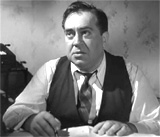
|
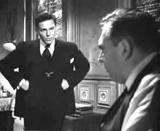
|
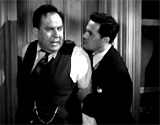
|
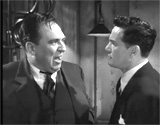
|
|
Joe's Threatening Proposal to His Estranged Brother
Leo (Thomas Gomez) to Join a Syndicate, and Leo's Emphatic Refusal
|
- Joe reminded Leo that he was also a "crook" who was taking money from
suckers and others just like the big rackets: ("Don't you take
the nickels and dimes and pennies from people who bet, just like
every other crook, big or little, in this racket?"); although he
was hypocritical, Leo felt justified in running an illegal business
because he had hired slum outcasts, the disadvantaged, and down-and-out
misfits to work his operation, as a way to escape their lowly
place in life; Leo counter-accused his brother of corruption: "What
you are: a crook and a cheat and a gangster!"
- Joe kept bargaining with Leo to join him: "Tucker will make you honest,
Tucker will make you respectable. He's giving me a quarter of a million
dollars to create public sentiment to make policy legal, like bingo,
bango, and the Irish sweepstakes. I'm paying you back, Leo. I'll
make you rich, with an office on Wall Street up in the clouds!";
in the end, Leo emphatically rejected Joe's offer: "I’ll
give you my answer, calmly and sensibly. My final answer. My final
answer is finally No. The answer is No. Absolutely and finally No.
Finally and positively No. No! No! No! N – O!"
- after their discussion ended, Joe departed and phoned
Bunty (Raymond Largay); he ordered someone to tip the police to
raid his brother's illegal 'bank' and jail Leo, in order to use
a show of force to pressure his brother's compliance: "I want
my brother to know that Tucker is running policy. I wanna force him in"
- Leo's young, orphaned, sweet, innocent, clean-cut
working-class secretary-bookkeeper Doris Lowry (Beatrice Pearson)
had listened to Leo's entire discussion with his brother about
Leo's shady business that was taking money from hard-working folks
who should instead have been paying their weekly insurance premiums;
she announced to Leo that although she was very grateful for her
employment, she was leaving her job: ("I feel I can't stay here");
Leo was spiteful toward Joe's influence on her: ("Black sheep like
to make everybody else look black")
- suddenly, the police raided Leo's 'bank' business
and ushered all of the workers into a police van outside; later
that evening in Tucker's luxurious apartment, Joe phoned the jail
to speak to his disgruntled brother; he was interrupted by mob
boss Tucker's sultry, conniving femme fatale wife Edna (Marie
Windsor) (in one of two short screen appearances), who with a breathy
and seductive voice came onto him in the bedroom: "Sometimes
you act like a human being, Like a person who worries. You're wide
open, Joe. I can see into you without looking...More interesting
than when you have a rock for a husband, like mine. He's a stone,
that man. Whole world are rocks and stones to him"
- Joe paid the fines for both Doris and Leo (and all
the other workers) so that they could be released from the Magistrates
Court; Leo made an apt comparison to Joe's treatment: "All that
Cain did to Abel was murder him...Thanks for paying my fine and
unlocking me with the same key you used to lock me up with"; although
urged by Joe to quit his business immediately, Leo vowed to wrap
things up after paying off debts to his customers: ("I'm not that
big a crook. People have bets in my bank. That's a debt. I'll pay
off what I owe tomorrow, whatever it is, and then I'm finished")
- during one basically long
take, Joe engaged in a lengthy and seductive discussion
in the back seat of a taxi with Doris, as she returned home; at
first, she described the irresistible Joe as evil: "You're
a strange man, and a very evil one.."; he replied: "And
you're a sweet child, and you want me to be wicked to you...you're
squirming for me to do something wicked to you. Make a pass for you,
bowl you over, sweep you up, take the childishness out of you, and
give you money and sin. That's real wickedness";
she countered: "What are you trying to make me think, Mr. Morse? What are you trying to
make me think about myself - and you?"; she admitted: "I'm
a big girl now with a police record, thanks to you, and I
know it's not wicked to give and want nothing back"
- Joe proposed giving her a metaphorical "million-dollar
ruby" for nothing in return; Doris responded that she was no longer
fooled by magicians now that she was grown up: "I'm a big girl
now with a police record, thanks to you, and I know it's not wicked
to give and want nothing back"
- Joe immediately objected: "It's perverted. Don't
you see what it is? It's not natural"; he differed from Doris'
idea of giving freely; he felt that giving without wanting
anything in return was perverted; he then gave a long meditation
on guilt by describing his determined ideas about ambition and
getting pleasure by taking from others: ("To go to great expense
for something you want, that's natural"); he referenced the temptations
of the Garden of Eden - to "reach out" and take the riches of life
that he had always wanted - "To go to
great expense for something you want, that's natural. To reach
out to take it, that's human, that's natural. But to get your pleasure
from not taking, from cheating yourself deliberately like my brother
did today, from not getting, from not taking. Don't you see what
a black thing that is for a man to do? How it is to hate yourself
and your brother, make him feel that he's guilty, that, that I'm
guilty? Just to live and be guilty"
- on July 4th race day, as predicted, bankruptcy struck all the small
numbers banks in the city, including Leo's business; Joe visited
Leo's home and spoke to him and his wife Sylvia Morse (Georgia
Backus), promising (due to his guilty conscience) that he would
help Leo to ally himself with Tucker's "big crooks" operation: "I'll
see to it that you get out of the business in a couple months a
rich man"; however, Sylvia didn't want
her principled husband Leo to work with his corrupted brother:
("Don't have anything to do with him, Leo. You're a businessman");
Joe kept making more promises: "I've got it fixed for you the way
I said because you're my brother. That's why I'm here. To tell
you it's not so bad..."; Leo was reluctantly
forced by Joe to ally himself with Tucker's operation
- as Joe left his brother's apartment in a good mood
after clearing his conscience, he ran into Doris - who pointedly
asked: "Did you make him come into this Tucker thing with you?
Did you make him do that?"; when Joe admitted he had, Doris asked:
"Is that what you want? There must be something in you that's evil
and corrupt"; he tried to sweet-talk her again: ("I still have
that ruby, Doris"), and suggested she come to his office the next
day to apply for a high-paying job, now that she was unemployed
- that evening, Leo's bankrupted small-time numbers
runners met together, to hear the terms of the advanced capital
loans that they would receive from the "combination": ("The capital
we advance to pay off 776 is to be a prior lien on the business
itself with regular 6% interest and a $5,000 dollar bonus for making
the loan. It's to be paid off by the week, so much a week, as much
as the business can handle. And each banker gets a drawing account
of $75 a week till the debt's paid off, then 1/3 of the profits")
- Leo received more bad news - his meek,
rat-like, and cowardly bookkeeper Freddy Bauer (Howland Chamberlin)
announced that he was also quitting; Joe pulled Bauer aside and
threatened: "Why go out of your way to make trouble for yourself?";
Bauer refused to be strong-armed and pressured to remain: "If I
go now and walk out of here, how are you gonna stop me?"; one of
the syndicate enforcers answered: "The combination will stop you,
Bauer. Stop you dead - in your tracks"; Bauer told his co-workers
who were also considering quitting: "We can't quit. They won't
let us. You heard them. They said they'd kill me if I quit"
- in a panic, Bauer phoned special prosecutor Link
Hall's office, and divulged the location of
Leo's newly-reorganized and overtaken mob numbers bank so that it could
be raided; he also promised to continue being an informant; as he was
leaving and proceeded down the stairs, he was confronted by a mobster
named Wally (Stanley Prager) who was working for Tucker's numbers-business
rival - Bill Ficco (Paul Fix); according to Wally, he offered Bauer a proposition
to make money for himself; the competitive Ficco, who was going into
the numbers business for himself, needed to acquire "a list of Tucker's
banks, the bankers, the collectors, the controllers"; Bauer was also
asked to arrange a private and secret meeting between Ficco and Leo:
("If you could get Leo Morse to some quiet place, we'd be there. That's
all you have to do"); Bauer refused: "I don't wanna have
anything to do with gangsters"
- meanwhile, Edna Tucker was working behind-the-scenes to manipulate
and torment Joe and also to belittle his manhood; when Joe appeared
back in his office, she was awaiting him with long black gloves
and a breathy voice to deliver "bad news" about the threat of wire-tapping of his phone by
the special prosecutor Link Hall - and she warned about a "little
click" if they were listening in; exasperated by her taunting, Joe
asked directly: "What do you want? What are you waiting to see?",
and she answered: "What kind of a man you are, you really are"; fearing
her strong-armed husband, Joe preferred to stay alive rather than
give in to his partner's seductive wife with her come-ons: ("If you need a broken man to love,
break your husband. I'm not a nickel. I don't spend my life on a
telephone. If that's what you want for love, you can't use me"), and he summarily dismissed her
- after Mrs. Tucker's visit, Joe worried about her
warnings of wire-tapping and that his own private desk phone was
wire-tapped; he was concerned that he and Tucker were being targeted
by special prosecutor Link Hall: "It was the first step in making
a case against the combination, and the combination was Ben Tucker
and myself"; he thought to himself (in voice-over): "A man could
spend the rest of his life trying to remember what he shouldn't have said"
- suddenly, Joe remembered that Doris had been left
alone in the outer office - he had earlier promised to see if he
could get her a job; she joined him for a walk down
Wall Street to Trinity Church (from the opening aerial view), and
in voice-over, he wondered: "I think she had made up her mind to
fall in love with me" - but it was not the appropriate time, now
that he was slowly beginning to realize that the law was
closing in on him; he also knew he had become
indebted to the syndicated mob for life and was one of its corrupted victims
- after their walk in his apartment, Joe confessed
that he personally enjoyed and was comforted by Doris' company,
because he could really talk to her and she was non-judgmental
about his delving into wicked and corrupt dealings: "My trouble
is, Miss Lowry, that I feel like midnight, and I don't know what
the morning will be, except, for a little while, I felt pretty
easy here, talking to you, liking you. You're the only one I ever
talk to, Doris"; they finally came together and kissed in his living room
- the next day, Doris and Bauer returned to Leo's
numbers-bank apartment and found themselves the victims of a raid
by the special prosecutor; Bauer fought off the police as he was
arrested and taken away in a patrol wagon with the other employees
- before a court hearling with the DA, Joe met with
Tucker who was angry about the raid on Leo's numbers-bank (and
its employees) and demanded to know why: "Why and how is what I
want to know, why and how and who"; Joe claimed they could plead
guilty and pay a fine to avoid further prosecution; Tucker was
also informed about how Ficco, his ex-partner during the "beer
days," was gathering information so that he could go into business
for himself in competition with Tucker; Tucker was ready to fight
for his combination's survival, against Ficco: "If he wants to
make a deal with us, he'll make it with a gun"
- Joe became worried about how his brother Leo would
fare: "I didn't bring Leo into the combination to take a beating...I
want him paid off and out. I want him out tonight"; to protect his
brother, he even suggested that he would take over Leo's numbers-bank:
"I'll take over instead then. I'll pay off Leo and
take over myself personally"
- after the court hearing, Doris reprimanded Joe,
and stated how she was sorry that she had ever thought that she
could love him; because of his wicked and corrupt machinations,
he had brought on all the problems involving Leo and herself: "If
I ever thought of loving you, it was to love something rotten and
corrupt in myself. I don't wish to love you or see you or know
you, And I'll try not to remember you"; she was spiteful that Joe
had pressured Leo into joining the combination - and that it would
eventually kill him: "You forced Leo to stay in the business....You
tempted him, the way you try to tempt me now to forget what's so
plain here in front of me. Well, you'll see. Leo's not like you,
he'll die of this. Oh, you'll make him rich - in his death. Well,
I don't wish to die of loving you"
- Joe attempted to make right with his brother Leo
and buy out his numbers-bank to relieve him of any further troubles:
("I arranged with Tucker for you to quit tonight. I'll pay off
your investments"), but the morally-principled Leo rejected Joe's
(and Tucker's) offer, and was ready to quit the business: "I don't
want it, Joe. The money I made in this rotten business is no good
for me, Joe. I don't want it back. And Tucker's money is no good,
either"; Leo vainly begged for Joe to get out before someone died:
"You stop now. Stop now, Joe, Because I'm getting old, and old
people die. There will be nobody to cry for you"
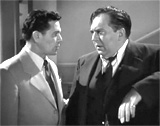
|
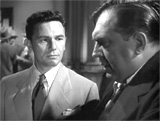
|
|
Leo Rejecting His Brother Joe's Offer to Buy Out
His Numbers-Bank Business
|
- upon his return to his office, Joe discovered that
his distrusting law partner Wheelock had turned against him; he watched
as Wheelock had tried but failed to open his wall safe, to retrieve
Morse's 'dirty money'; after Wheelock left, Joe took his gun from
his desk drawer, opened the safe and grabbed wads of cash (Tucker's
pay-off for Joe's legal fees); the self-destructive Morse realized
how he had lost and ruined his own law career by his dogged pursuit
of riches: (voice-over) - "I knew I would never come back
to this fancy office again. I could
see the cobwebs on the walls and a sign: 'Office for rent for a
smart young lawyer trying to get ahead in the world'"; Joe
took a slow walk in a deserted and dark Wall Street district -
dwarfed by the towering buildings surrounding him
- in the next evening scene outside a bakery store,
the worried Leo sensed that his bookkeeper Freddy Bauer was about
to turn informant (to a rival gang); Leo suddenly became protective
of his brother and yelled at Bauer: "I’ll
kill you with my own hands rather than let you put the mark of
Cain on my brother"; after Leo drove off, Wally came up to
Bauer, reminding him he was supposed to set up Leo for a meeting: "Now
is the time to set up that meeting between Ficco and Leo Morse,
tonight"
- later in the evening in a small, empty restaurant,
a nervous Bauer (with Wally sitting nearby) awaited the late
arrival of Leo to join him for dinner; Leo had been enticed to
meet with his suicidal employee who expressed how he wanted to
quit the racket; Leo's thoughts about death forecast his own impending
murder, as he ruminated about how it would be to die of a heart
attack: "I'm a man with heart trouble. I die almost everyday myself. That's
the way I live. It's a silly habit. You know, sometimes you feel
as though you're dying. Here and here, here, you're dying while
you're breathing"
- ominously, a few black cars pulled up outside the
restaurant, and an astounded Leo realized that he had been set-up
and betrayed by the Judas-like Bauer - he asked: "Freddy,
what have you done to me?"; after Bauer
tried to flee, he was shot point-blank and murdered by Wally ("Kill
him! He knows me!"), and Leo was kidnapped and dragged away
at gun-point [Note: A similar restaurant scene was found in Coppola's The
Godfather (1972).]
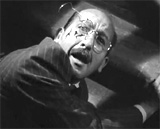
|
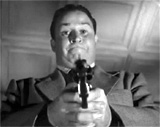
|
>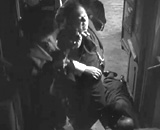
|
|
Bauer's Murder (Shot by Wally) After Setting Up
Leo, Who Was Then Kidnapped
|
- meanwhile, at a late-night nightclub with Doris,
the doomed Morse was deliberately getting drunk while predicting
his own demise and death: "That's what I am. Dead, disbarred,
done for, finished, kaput"; when Doris asked: "When did
this happen, Joe?", he responded:
"The day I was born"; he was close to admitting that
his judgment to legally represent a racketeer was flawed: "I took
a risk to make a million. Wasn't that right for me? I lost...I'm
running away with a pocketful of money. You wanna come?"; when
he offered her the money he had made, she rejected it: "Oh, Joe,
I don't want this money. Nobody wants it"
- Doris proposed a way for Joe to save and redeem
himself, by helping him to seek salvation and reset his life:
"I want somehow to get you, Joe. To save you for yourself
and myself. Somehow you're wild and crazy and stuck in a trap. And somehow you
won't fight to get out. (she paused) And somehow I love
you" - she kissed him
- Joe (and Doris) were interrupted by newspaper headlines
(TUCKER-FICCO WAR! 1 Dead 1 Kidnapped - Leo Morse Snatched; Bookkeeper
Slain; RIVAL GANGS CLASH IN NUMBERS RACKET) that Leo's bookkeeper
Freddy Bauer had been killed and that Leo had been kidnapped
by Tucker's ex-business partner - Ficco (Paul Fix) from Chicago
- in fact, Tucker had used the deadly incident as
a way to unite and combine the forces of Ficco within his own organization,
and further consolidate his power over Ficco and any other competitors:
(Tucker to Ficco: "I'm taking you in. On my terms, Ficco, not
yours"); with consolidated power ("Do what you have to
do. Go as far as you have to go"), Tucker ordered Ficco to
hold everyone in line, allow none of the workers to quit the banks,
and continue with bank-business as usual; as a way to communicate
with Tucker, Tucker stated that Ficco was to report to Morse personally,
and not use any of the tapped phones; Ficco (who suggested murdering
Morse: "Blow him off, get rid of him") was ordered to release Leo as soon as possible
- in the middle of the night, Morse suddenly arrived
at Tucker's home, to confront both Ficco and Tucker with questions:
"Where's my brother? Where's Ficco? Where did Ficco take my brother?"; in
vengeful retaliation against the combined forces of Tucker and Ficco
in Tucker's upstairs office, Morse confronted the two gangsters,
and was stunned to learn that Leo had died of a heart attack
and his body had been callously dumped: ("I had him dumped on the
rocks near the river, by the lighthouse, under the bridge")
- when Tucker's tapped phone rang, Morse cleverly
removed the receiver to record their subsequent conversation that
would incriminate Ficco for Bauer's and Leo's deaths, and indict
Tucker for all of his criminal activities; Morse taunted both of
them: "I'm not gonna end up on the rocks in the river, like
my brother. I'll walk out of here alive to hang the both of ya";
during a climactic shoot-out in the dark between the three men, Ficco
shot and killed Tucker, while Joe retaliated by killing Ficco
- in the conclusion, at dawn, Joe (with Doris trailing
behind) raced to search for his estranged brother Leo's discarded
body - he passed factories and a meat-packing area, and ran down
a great stone staircase - almost an allegorical descent into hell; he
described his descent, in voice-over, from
Riverside Drive down to the large rock formations by the Hudson
River lighthouse under the George Washington Bridge girders - where
he found the dumped body of Leo: ("I
wanted to find Leo, to see him once more. It was morning by then,
dawn, and naturally I was feeling very bad there as I went down there.
I just kept going down and down there. It was like going down to
the bottom of the world to find my brother. I found my brother's
body at the bottom there, where they had thrown it away on the rocks
by the river, like an old, dirty rag nobody wants. He was dead, and
I felt I had killed him")
|
Joe's Search For and Discovery of Leo's Discarded
Corpse
|
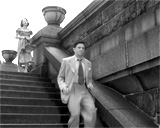
|
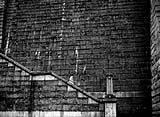
|
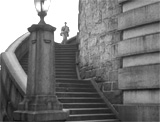
|
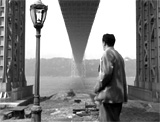
|
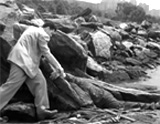
|
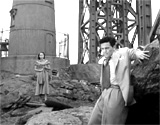
|
- after finding Leo's body in the depths,
Joe was determined to find justice for his brother by working with
Link Hall to end corruption; he and Doris walked off, arm-in-arm,
to an uncertain future - walking up toward the lighthouse (a symbol
of hope and redemption); he would now
turn himself in to District Attorney Link Hall to be redeemed: "I
turned back to give myself up to Hall, because if a man's life can
be lived so long and come out this way, like rubbish, then something
was horrible and had to be ended one way or another, and I decided
to help"
|

Film's Opening - A High Angle Shot: "This is Wall
Street..."


Corrupt Wall Street Lawyer Joe Morse (John Garfield)
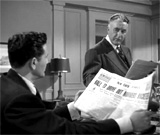
Joe Morse's Legal Partner Hobe Wheelock (Paul McVey)

Headlines: Special Prosecutor Link Hall To Drive Out Numbers Racketeers


Joe Speaking with Crime Boss Racketeer Ben Tucker (Roy Roberts) of Tucker Enterprises,
Inc.
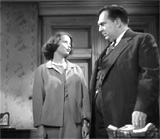
Doris (Beatrice
Pearson) Quitting Her Job in Leo's Small-Time Numbers 'Bank'

Police Raid on Leo's Illegal Numbers Racket
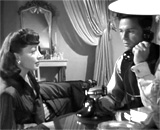
Ben Tucker's Seductive Moll Wife Edna (Marie Windsor) with Joe
in Her Bedroom While He Was Making a Phone Call to Leo
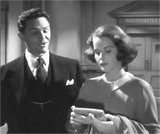

Joe's Lengthy Discussion with Doris - After Her Jail
Release and in Back Seat of Taxi
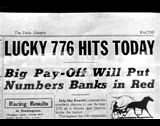
Race Day - July 4th - Bankruptcy for Many Numbers Banks
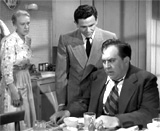
After Race Day, Joe Tried to Reassure His Bankrupted Brother and
His Wife Sylvia
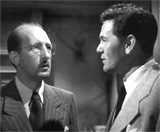
Leo's Meek Bookkeeper Freddy Bauer (Howland Chamberlin) - Threatening
to Quit - He Was Pressured by Joe to Remain and Work For the Mob
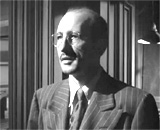
Bauer to His Ex-Co-Workers: "We can't quit. They won't let us"
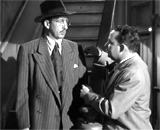
Bauer Confronted by Wally - A Member of Tucker's Rival Gang Led by
Ficco
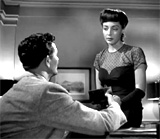

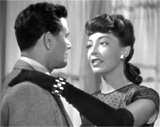
In His Office, Joe with Sultry, Taunting Femme Fatale
Edna Tucker
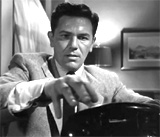
Joe Worried That His Private Desk Phone Had Been Tapped
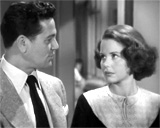
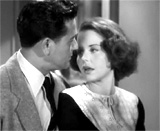
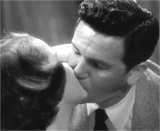
Joe Morse With Doris - A Few Moments of Peace and
Comfort Away From His Corrupt Dealings
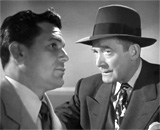
Joe with Worried Racketeer Ben Tucker
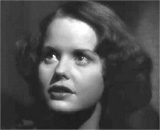
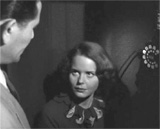
Joe Harshly Reprimanded by Doris After the Raid on Leo's "Bank"
and Her Subsequent Court Hearing

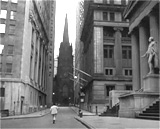
Joe's Walk Through Deserted Wall Street
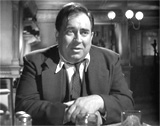
Leo Forecasting His Own Death in Restaurant with Bauer
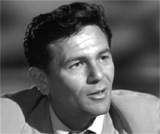
Joe Morse to Doris: "I took a risk to make a million...."
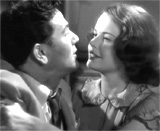
Doris Rejecting The Money Joe Offered Her, But Offering
Him Her Love Instead

Headlines: "Leo Morse Snatched; Bookkeeper
Slain"

Gangster Bill Ficco (Paul Fix) - Tucker's Rival
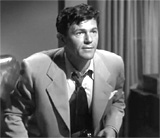
Morse's Taunt to Ficco and Tucker Before a Shootout in the Dark:
"I'll walk out of here alive to hang the both of ya"

Ending: Joe Walking Away with Doris to Seek Justice
|





































